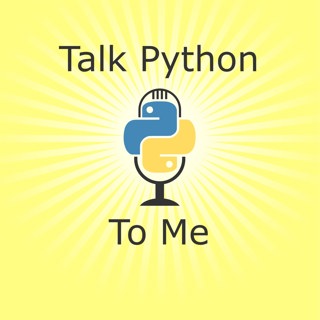
#523: Pyrefly: Fast, IDE-friendly typing for Python
Python typing got fast enough to feel invisible. Pyrefly is a new, open source type checker and IDE language server from Meta, written in Rust, with a focus on instant feedback and real-world DX. Today, we will dig into what it is, why it exists, and how it plays with the rest of the typing ecosystem. We have Abby Mitchell, Danny Yang, and Kyle Into from Pyrefly here to dive into the project.
13 Loka 1h 7min

#522: Data Sci Tips and Tricks from CodeCut.ai
Today we’re turning tiny tips into big wins. Khuyen Tran, creator of CodeCut.ai, has shipped hundreds of bite-size Python and data science snippets across four years. We dig into open-source tools you can use right now, cleaner workflows, and why notebooks and scripts don’t have to be enemies. If you want faster insights with fewer yak-shaves, this one’s packed with takeaways you can apply before lunch. Let’s get into it.
6 Loka 1h 9min

#521: Red Teaming LLMs and GenAI with PyRIT
English is now an API. Our apps read untrusted text; they follow instructions hidden in plain sight, and sometimes they turn that text into action. If you connect a model to tools or let it read documents from the wild, you have created a brand new attack surface. In this episode, we will make that concrete. We will talk about the attacks teams are seeing in 2025, the defenses that actually work, and how to test those defenses the same way we test code. Our guides are Tori Westerhoff and Roman Lutz from Microsoft. They help lead AI red teaming and build PyRIT, a Python framework the Microsoft AI Red Team uses to pressure test real products. By the end of this hour you will know where the biggest risks live, what you can ship this quarter to reduce them, and how PyRIT can turn security from a one time audit into an everyday engineering practice.
29 Syys 1h 2min

#520: pyx - the other side of the uv coin (announcing pyx)
A couple years ago, Charlie Marsh lit a fire under Python tooling with Ruff and then uv. Today he’s back with something on the other side of that coin: pyx. Pyx isn’t a PyPI replacement. Think server, not just index. It mirrors PyPI, plays fine with pip or uv, and aims to make installs fast and predictable by letting a smart client talk to a smart server. When the client and server understand each other, you get new fast paths, fewer edge cases, and the kind of reliability teams beg for. If Python packaging has felt like friction, this conversation is traction. Let’s get into it.
23 Syys 1h

#519: Data Science Cloud Lessons at Scale
Today on Talk Python: What really happens when your data work outgrows your laptop. Matthew Rocklin, creator of Dask and cofounder of Coiled, and Nat Tabris a staff software engineer at Coiled join me to unpack the messy truth of cloud-scale Python. During the episode we actually spin up a 1,000 core cluster from a notebook, twice! We also discuss picking between pandas and Polars, when GPUs help, and how to avoid surprise bills. Real lessons, real tradeoffs, shared by people who have built this stuff. Stick around.
18 Syys 1h 2min

#518: Celebrating Django's 20th Birthday With Its Creators
Twenty years after a scrappy newsroom team hacked together a framework to ship stories fast, Django remains the Python web framework that ships real apps, responsibly. In this anniversary roundtable with its creators and long-time stewards: Simon Willison, Adrian Holovaty, Will Vincent, Jeff Triplett, and Thibaud Colas, we trace the path from the Lawrence Journal-World to 1.0, DjangoCon, and the DSF; unpack how a BSD license and a culture of docs, tests, and mentorship grew a global community; and revisit lessons from deployments like Instagram. We talk modern Django too: ASGI and async, HTMX-friendly patterns, building APIs with DRF and Django Ninja, and how Django pairs with React and serverless without losing its batteries-included soul. You’ll hear about Django Girls, Djangonauts, and the Django Fellowship that keep momentum going, plus where Django fits in today’s AI stacks. Finally, we look ahead at the next decade of speed, security, and sustainability.
29 Elo 1h 8min

#517: Agentic Al Programming with Python
Agentic AI programming is what happens when coding assistants stop acting like autocomplete and start collaborating on real work. In this episode, we cut through the hype and incentives to define “agentic,” then get hands-on with how tools like Cursor, Claude Code, and LangChain actually behave inside an established codebase. Our guest, Matt Makai, now VP of Developer Relations at DigitalOcean, creator of Full Stack Python and Plushcap, shares hard-won tactics. We unpack what breaks, from brittle “generate a bunch of tests” requests to agents amplifying technical debt and uneven design patterns. Plus, we also discuss a sane git workflow for AI-sized diffs. You’ll hear practical Claude tips, why developers write more bugs when typing less, and where open source agents are headed. Hint: The destination is humans as editors of systems, not just typists of code.
22 Elo 1h 17min

